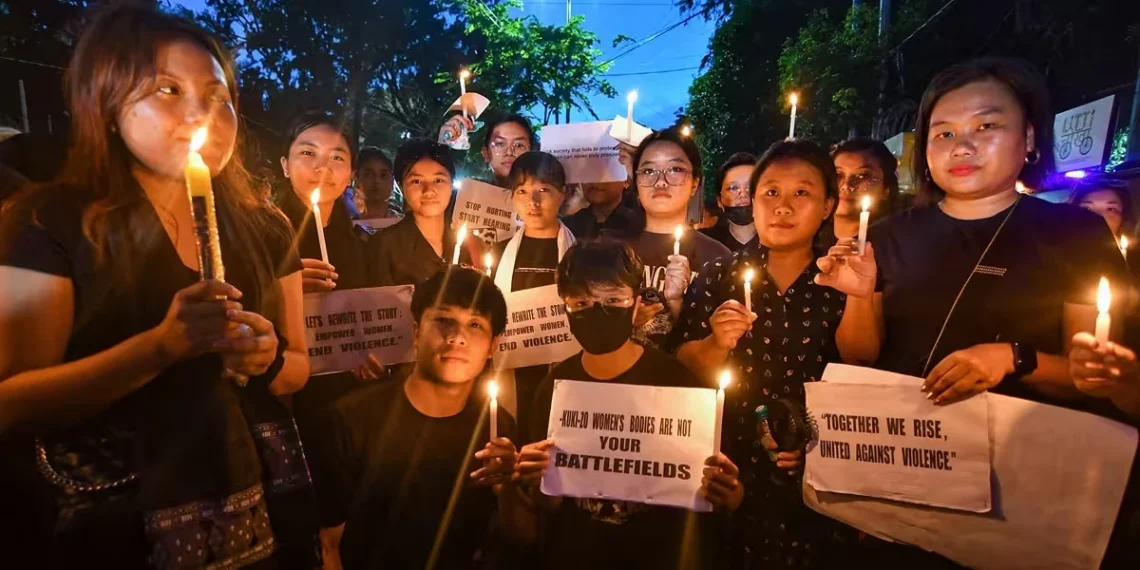Kuki-Zo Voices Silenced – Despite being an officially invited speaker, Dr. Seilen Haokip was abruptly removed from a DU panel, sparking allegations of bias and intimidation. Activists demand answers. #JusticeForKukiZo
BY PC Bureau
The Delhi University Literature Festival (DULF) has come under fire after organizers abruptly removed Dr. Seilen Haokip, a Kuki-Zo scholar, from a scheduled panel discussion. The last-minute decision has sparked allegations of censorship, institutional bias, and intimidation by Meitei extremist groups, drawing sharp criticism from students, academics, and activists.
Dr. Haokip, who was invited to speak on a panel titled “The Great Game East: The Northeast Cauldron”, was set to discuss the Northeast’s strategic and political landscape within India. However, upon arriving at the venue, he was informed that he had been barred from speaking.
“This was a deliberate and calculated attempt to silence Kuki-Zo voices,” said Young Kuki, a student-led advocacy group. “Dr. Haokip was officially invited. Over 60 Kuki-Zo students turned up to listen to their representative, only to be humiliated and denied their right to hear him speak.”
ALSO READ: Manipur Authorities Reject COCOMI’s Plea to Extend Weapon Surrender Deadline
Students who had come to attend the session were shocked when they realized that Dr. Haokip’s name had been quietly removed from the schedule. When they confronted the festival organizers, they were met with dismissive responses.
“Siddharth, one of the festival organizers, told us, ‘I am not answerable to you,’” said Lalminthang Vaiphei, a student present at the event. “He refused to explain why Dr. Haokip was removed. When we pressed further, he claimed that Dr. Haokip had voluntarily withdrawn—but that was an outright lie.”
To challenge the claim, students called Dr. Haokip on the spot. The scholar, speaking over speakerphone, categorically denied withdrawing and confirmed that he had been barred from speaking.
“I was told that my presence was creating discomfort for certain groups,” Dr. Haokip later told reporters. “But this isn’t about discomfort. This is about deliberate suppression of Kuki-Zo voices.”
ALSO READ: Kuki Students’ Organisation Condemns DU over Seilen Haopik
Allegations of Meitei Extremist Influence
According to Young Kuki, the decision to remove Dr. Haokip was made under pressure from COCOMI (Coordinating Committee on Manipur Integrity), a Meitei organization that has been accused of links to UAPA-designated insurgent groups.
“This is part of a larger pattern,” said Lunminlen Kipgen, a student activist. “Institutions in India are scared to let Kuki-Zo people speak the truth. Why is Delhi University listening to a group that openly aligns itself with insurgents instead of allowing a peaceful academic discussion?”
For the Kuki-Zo community, the incident is not an isolated event but part of a wider history of marginalization.
“For over 20 months, we have endured ethnic cleansing, mass killings, and state-sponsored violence in Manipur,” said Neingam Haokip, a Kuki-Zo student at DU. “Our villages have been burned, our people displaced, and now our voices are being erased—even in academic spaces that claim to champion free speech.”
“Delhi University Has Hosted Separatists and Ex-Militants—So Why Not a Kuki-Zo Scholar?”
Critics have pointed out the double standards in Delhi University’s policies, highlighting that the institution has previously hosted speakers with far more controversial backgrounds.
“Delhi University has invited former militants, separatists, and individuals with criminal records to speak at events,” Young Kuki said in their official statement. “Yet somehow, a Kuki-Zo scholar—whose community has been engaged in official peace talks with the Government of India since 2005—is considered too controversial? What kind of joke is this?”
The group accused Delhi University of “bending over” for Meitei groups instead of upholding its commitment to free speech.
“This wasn’t about avoiding controversy. It was about choosing sides. And DU has chosen to side with those who spew hate, spread lies, and encourage ethnic division,” the statement added.
The removal of Dr. Haokip has sparked a broader debate about the treatment of Kuki-Zo voices in academic and literary spaces.
“This sets a dangerous precedent,” said Dr. Mary Gangte, a historian specializing in Northeast India. “If academic institutions start yielding to pressure from extremist groups, it will only deepen the exclusion of already marginalized communities.”
Others questioned the silence of Delhi University’s faculty and intellectuals.
“Where are the so-called champions of free speech?” asked Rangsei Kipgen, a research scholar at JNU. “Would they have remained silent if this had happened to someone from a more privileged background?”
The incident has led to mounting calls for Delhi University to publicly explain its decision and ensure that such censorship does not happen again.
“This act of discrimination will not be forgotten,” Young Kuki warned. “Kuki-Zo voices will not be silenced. No amount of censorship, institutional bias, or Meitei propaganda will erase the truth.”
As of now, Delhi University and the festival organizers have not responded to the allegations.














